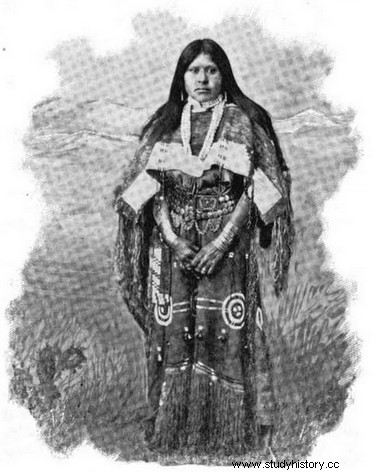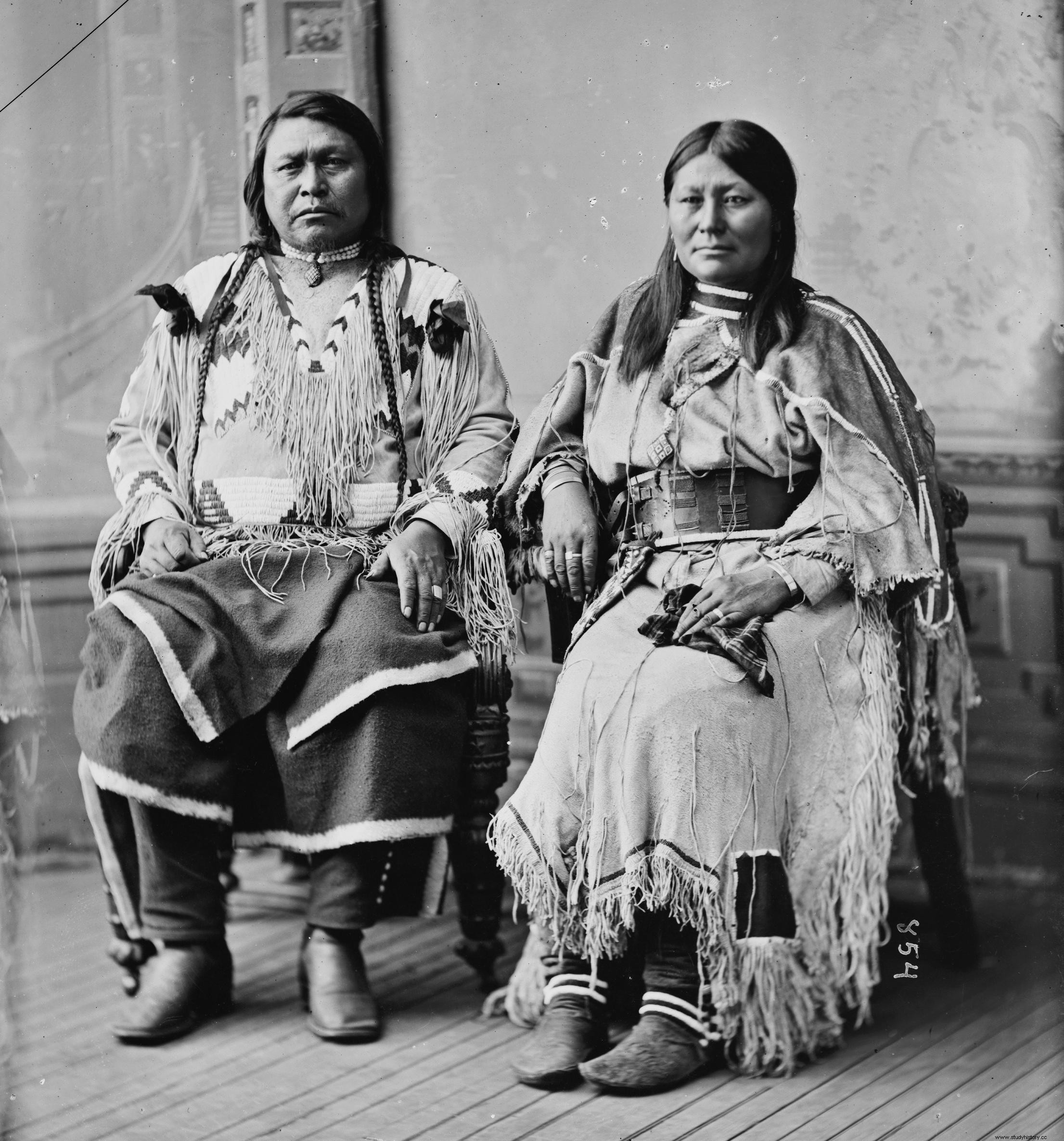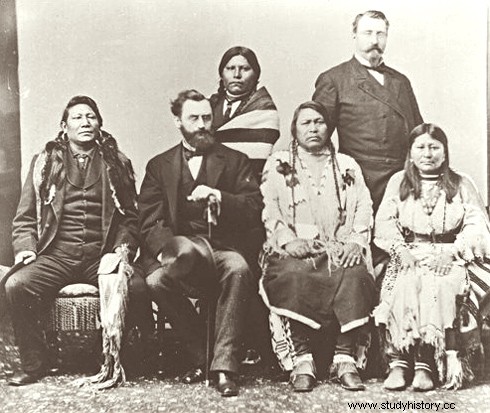A member of the Ute Indian people, Chipeta (1843 or 1844 – 1924) played the role of leader of her people and, alongside her husband, negotiated several treaties with the settlers. She is the only woman admitted to tribal councils.
White songbird

Chipeta was born – under another name – in Colorado, into a tribe of Kiowa-Apaches (also called “Plains Apaches”) around 1843 or 1844. The conquest of the West – the colonization of the territories between the Mississippi and the Pacific Ocean, occupied by indigenous peoples – then in full swing, against a backdrop of Indian wars, massacres and deportations.
When Chipeta is only about two years old, her tribe is the victim of a massacre; the girl is the only survivor. Utes discover the ruined camp and the child, whom they collect and baptize Chipeta, a name meaning White Songbird in the Shoshone language – spoken in the northeastern regions of the United States. With them, she learns their culture, their traditions. Growing up, she distinguished herself by her mastery of beading and tanning, as well as her beauty. She plays music, and sings in three different languages.
Ouray
When she was still a little girl, in 1851, she met Ouray, a member of another Ute tribe ten years her senior; considered a great warrior, hunter and horseman, he would later become chief of the tribe. Ouray marries a woman named Black Mare, with whom he will have a son:Pahlone. When Black Mare died in 1858, Chipeta was chosen to help care for the young child.
The following year, at the age of about sixteen, Chipeta married Ouray, with whom she would adopt and raise four children. Spouses are united by a relationship of mutual trust and respect. When Ouray became chief of the tribe in 1860, he made Chipeta his adviser and his confidante:she often sat by his side during tribal councils, when women were usually not admitted. She also assists him during negotiations; Known as the "Ute peacemakers (or peacemakers)," both Chipeta and Ouray sought to maintain good relations with their neighbors, including white settlers. Out of a desire for peace no doubt, but also because they do not think they can defeat the armies of the United States.

Relations with settlers
From 1858, the discovery of gold in Colorado aggravated the situation of the Amerindian tribes whose territories were threatened by the conquest of the West, and inflamed the conflicts with the white settlers. Chipeta and Ouray do their best to keep the peace. Hearing that a raid was to be carried out by members of his people against a settlement of white settlers, Chipeta rode for four days and swam across the Gunnison River to warn them; she saves the life of a child and his mother, who will testify:“Chief Ouray and his wife did everything to make us comfortable. We were given the whole house and found carpets on the floor, lamps on the tables and a stove with fire brightly burning. Mrs. Ouray shed tears over us. » (Chief Ouray and his wife went out of their way to make us feel comfortable. We were given the whole house, with rugs on the floor, lamps on the tables and a stove with a blazing fire. “Ms. Ouray” shed tears for us).
In February 1861, the territory of Colorado was created; Chipeta helps and her husband participates in the delegation that negotiates a treaty with the Colorado government to try to protect the hunting territories and sacred lands of the Utes, in which the white settlers settle and prospect. Ouray acts as a translator during a meeting with the governor of Colorado. In 1863, the Treaty of Conejos was signed:it reduced their territory by 50% and made them lose in particular the sources of Manitou Springs and the sacred lands of Mount Pikes Peak.
The loss of their land, as well as pressure from the Colorado government to force Native Americans to settle down, become farmers, give up horse racing and convert to Christianity, exacerbated tensions. In 1879, a conflict broke out with the Indian agent Nathan Meeker, and degenerated into a revolt with the Meeker massacre, during which Utes killed eleven white men and kidnapped five women and children. Ouray and Chipeta, whose tribe did not participate in the revolt, then intervene to free the hostages.
The Ute Deportation Law
In 1880, when, for lack of game on the land allocated to them, the Utes continued to hunt on territories lost during the Treaty of Conejos, a delegation led by Chipeta and Ouray was sent to Washington. They have two jobs:to testify before Congress about the Ute revolt of the previous year, and to negotiate a treaty regarding the removal of Ute reservations. As they take the train to get there, they come close to being lynched:an angry mob of white settlers mistake them for accomplices in the Meeker massacre.
In Washington, Chipeta is accepted as a member of the delegation and testifies before Congress. She thus participates in the treaty negotiations, in which the Utes are in a weak position, all the more so following the Meeker massacre. About the treaties signed with the white settlers, Ouray would have said:“Agreements the Indian makes with the government are like the agreements a buffalo makes with the hunter after it has been pierced by many arrows. All it can do is lie down and give in. » (The deals Native Americans made with the government are similar to those made by a bison with a hunter after being pierced with many arrows. All he can do is lie down and give in).

The Ute Removal Act of 1880 (the Ute Deportation Act of 1880) stripped the Utes of their remaining Colorado lands and forced them to settle on a reservation in Utah. Ouray will not know the reserve:he dies on his return from Washington. Chipeta, she, considered and respected as a wise woman, remains chief of the Utes.
Indian Citizenship Act
The Utes and Chipeta settle in a reservation with poor and poorly irrigated land, where they are dependent on rations provided by the government. On the reservation, Chipeta remains highly respected and continues to attend all tribal council meetings, where she is the only woman.
Chipeta remarried and aged on the reservation, eventually losing his sight. She died there at the age of about eighty, in August 1924… just two months after US President Calvin Coolidge enacted the Indian Citizenship Act (the Indian Citizenship Act), which extends U.S. citizenship to Native Americans.
